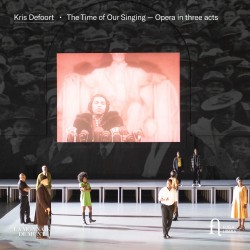 Kris Defoort – The Time of Our Singing
Kris Defoort – The Time of Our Singing
Claron McFadden; Mark S. Doss; Simon Bailey; Levy Sekgapane; La Monnaie Chamber Orchestra; Kwamé Ryan
Fuga Libera FUG837 (outhere-music.com/en/albums/kris-defoort-time-our-singing)
Belgian composer Kris Defoort’s multilayered opera The Time of Our Singing follows members of a mixed-race family through the years 1939 to 1992. Repeatedly they are torn apart by the pernicious effects of the racism they each have to confront in their lives. But their shared passion for music always brings them back together.
Defoort and his compatriot, librettist Peter van Kraaij, have adapted a 629-page novel by Richard Powers, published over 20 years ago. In contrast to the novel, which jumps around in time, the opera follows a traditional chronological narrative. The harmonic language is familiar, the rhythmic structure clear. Yet it sounds startlingly new, and fundamentally of our time.
The many musical references are taken directly from Powers’ novel. Since they are integral to the story, Defoort weaves them right into the texture of the opera. The sounds of Dowland, Purcell, Bach, Puccini, spirituals, cool jazz, rock, hip-hop, free jazz and rap all shape the characters in this African American-Jewish family. The hip-hop beat that drives the activist daughter Ruth’s sensational I will tell you about Blackness has an urgency that intensifies her fury. Exquisite modernist textures colour the heartbreaking deathbed scene between the father, David, a Jewish refugee from Nazi Germany, and younger son Joey, a pianist. The transformation of Purcell’s Music for a While into an infectiously catchy vocal ensemble is used to bring the three siblings together for what turns out to be the last time. “Classics meets the street,” the eldest son Jonah, an opera singer, says. “People need this,” he adds. Indeed.
Defoort and van Kraaij draw on key historic events in the never-ending struggle for civil rights in America. Inevitably what happens globally impacts each character directly. Marian Anderson’s concert at the Lincoln Memorial in 1939 brings hope and joy to Delia, an African American singer, and David when they first meet there. But the Rodney King riots in 1992 bring tragedy for Jonah.
This live recording was made during the first staged production at La Monnaie in 2021, which won the the International Opera Award 2022 for Best World Premiere. The excellent cast, with Claron McFadden, Abigail Abraham, Lilly Jørstad, Levy Sekgapane, Simon Bailey, Peter Braithwaite and Mark S. Doss, the jazz quartet featuring Mark Turner’s melancholy tenor saxophone, the La Monnaie Chamber Orchestra and choirs, are all led by Canadian-Trinidadian conductor Kwamé Ryan with palpable insight and versatility.



